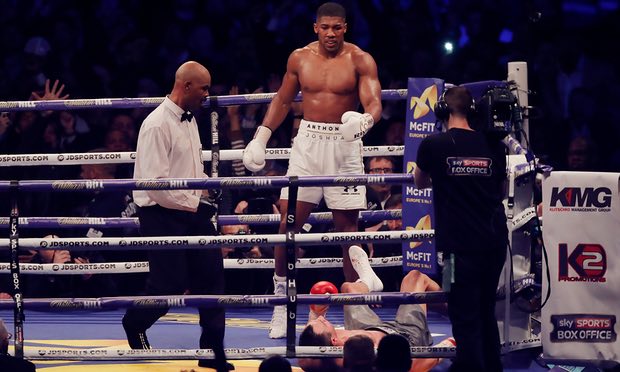London – One image above all lingers in the memory from Anthony Joshua’s world heavyweight title victory over Wladimir Klitschko at Wembley Stadium on Saturday night. It is of the 27-year-old from Watford glowering at his crumpled opponent in a pose strikingly reminiscent of Muhammad Ali after he had knocked out Sonny Liston.
Ali quickly went from having Liston to the world at his feet. Joshua’s entourage and assorted experts lined up on Sunday to predict that he would soon follow suit.
After his 11th-round victory Joshua was serenaded by the 90,000 crowd and excitable television executives from the US cable rivals HBO and Showtime. But it was his promoter, Eddie Hearn, who made the sweetest music.
“Anthony is now the biggest star in British sport, and the biggest star in world boxing,” he exclaimed, before promising to take Joshua into new markets, including China, the Middle East and Africa. Already he had held talks about a fight at the Bird’s Nest stadium in Beijing.
Perhaps the only one not getting carried away was Joshua himself. “I want to be a champion outside the ring first and foremost,” he told reporters long after Saturday night had given way to Sunday morning. “Without the belts, or the boxing, I am a good man. I am a family man. I don’t flip tables and punch people in press conferences. Boxing is a tough sport, I just try to express myself in the ring.”
It is that humility – as well as Joshua’s exceptional physical and sporting ability – that has made him the overwhelming favourite for the BBC’s Sports Personality of the Year award and had sponsors beating a path to his door. Already he has endorsements from Under Armour and Jaguar and nearly a dozen other brands. Mark Borkowski, a PR and brand expert, expects that number to mushroom. “He represents hope,” says Borkowski. “That is why people buy into him. He also looks great – and he has a massive female following. His appeal goes far beyond boxing’s hardcore.”
There is something else, too. “He is also very honest, and people like that transparency,” adds Borkowski. “After Saturday’s fight he made a big deal of praising Klitschko, and also said he hoped young kids watching would want to emulate and surpass what he had achieved. I don’t think those were media-trained soundbites. You are not going to remember a script after 11 rounds of someone trying to knock you out.
“Britain hasn’t had a gentleman boxer since Henry Cooper or Frank Bruno – but Joshua is a gentleman fighter. This is someone who could unify the belts but also get a whole new audience into boxing.”
The days when millions tuned into ITV in the 1980s and 1990s to watch the likes of Nigel Benn, Chris Eubank and “Prince” Naseem Hamed fight were thought to be gone for ever. But the sport is slowly percolating back into the mainstream. One recent survey found that while 20% of millennials say they do not follow sport at all – an answer given by only 9% of over-35s – a growing number do like boxing.
There will be those who will argue – with some justification – that the gory sight of two people trying to knock each other into oblivion is primitive and queasy; especially with what we know now about the long-term dangers of concussion in sport.
That argument has been harder to refute in the past year. Not only has the promising welterweight Mike Towell lost his life after being knocked down in a title eliminator but two others – Nick Blackwell and Eduard Gutknecht – have been in comas following serious beatings.
Yet Joshua knows better than most that boxing seems to have a unique power, particularly among working-class kids, to improve health and turn lives around. He was born to Nigerian immigrants, who split when he was four or five, and showed immense sporting prowess when he was young, running 60 seconds for the 400m as a 12-year-old.
Yet, having left school at 16, he fell in with wrong people and started partying, drinking and smoking and getting into trouble. A year later he was facing a custodial sentence for fighting but was instead given an ankle tag. It was at that point he went to Finchley amateur boxing club with his cousin Ileyemi, intending to do a keep-fit class and lift weights. Instead he developed a taste for boxing and was quickly promoted to the GB Olympic squad.
There were bumps along the way – in 2010 he was arrested and given 100 hours of community service for being in possession of 8oz of cannabis, while wearing his Team GB tracksuit – but slowly the discipline of boxing turned his life around. He won a world championship silver in 2011, an Olympic gold at London 2012 and his first world title in 2016. He is estimated to have made £10m from Saturday’s fight, yet when he is not training in Sheffield he lives with his mum, Yeta Odusanya, a social worker, in a small, ex-local authority house in Golders Green, north-west London.
Inevitably there will be questions about whether Joshua can stay humble and grounded. But Hearn has no doubt of his class – inside or outside the ring. “Anthony always delivers,” he says. “He’s like gold dust. This is a golden time for boxing and for Anthony. He is about to go to stratospheric.”
After he defeated Liston, Ali hollered loudly about shaking up the world. Times have changed since then, of course, and no boxer will ever have the impact “the greatest” did.
But, in his own quiet way, Joshua hopes to have everyone talking about the heavyweight champion of the world again.
The Guardian Sport
